Imagine your perfect Sunday morning, spent right at home. What’s on the table for breakfast?
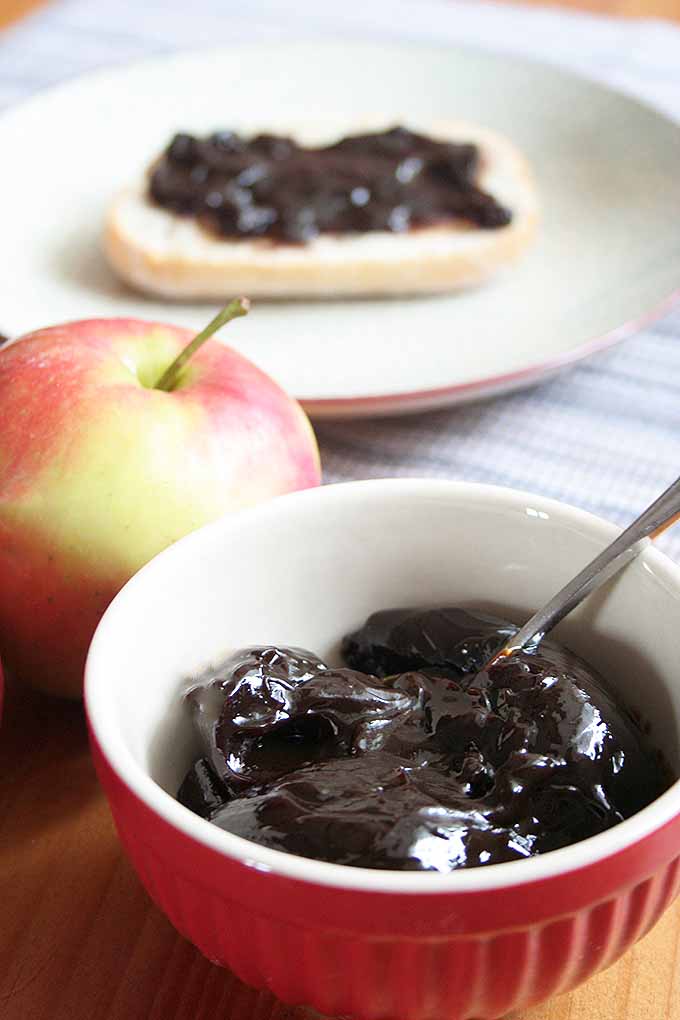
For me, I have a very specific image in my head when it comes to a relaxing, not to mention delicious, Sunday morning.
While my partner is grinding the coffee beans, and their wonderful smell is floating in the air, I will start preparing the pancakes.
But besides maple syrup, there is another spread that makes its way onto my serving tray. The rule applies:
No pancakes without apple spread.
Since I rediscovered this sweet and gooey treat a couple of years ago, I never want to miss it again.
Due to its pure and unique flavor, I prefer it to all other kinds of jam or jelly. (To be honest, lemon curd and thick-cut orange marmalade would be two other kinds I can’t resist either, but let’s not stray too far from the subject.)
What I love so much about this apple spread is that it consists of nothing else but apples and water.
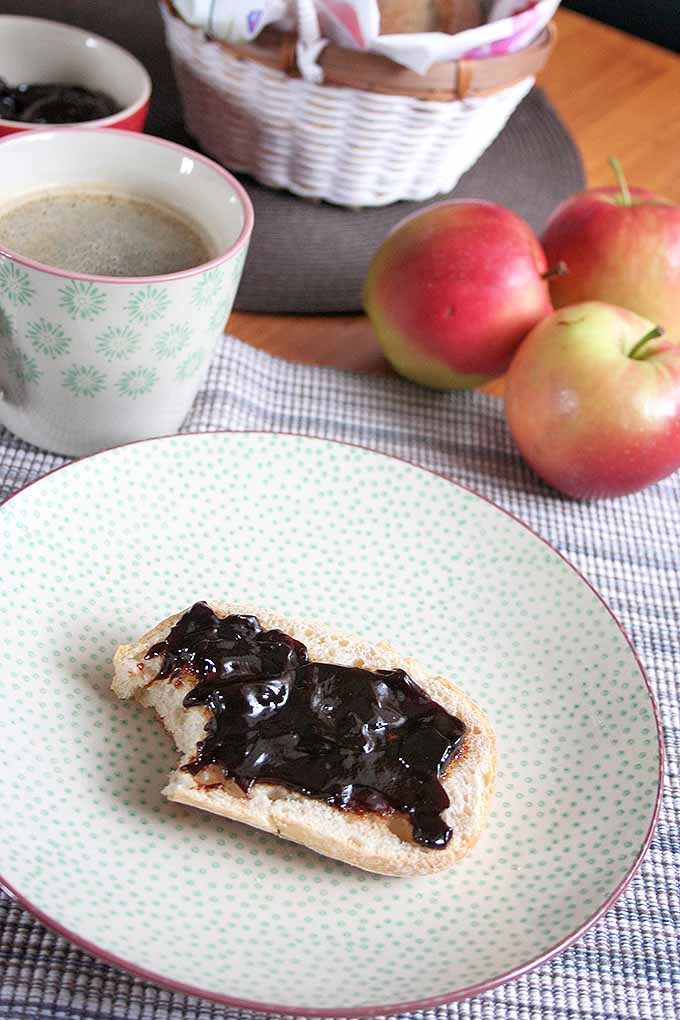
No additives, no preservatives, no bells or whistles.
I’m excited to share my simply delicious recipe with you, but let’s learn a little more about this apple spread’s background.
Natural and Local: The Origin of This Specialty
The history of this special treat is connected to the idea of making fruit preservable over long winters.
In earlier times, it was a very local product, but has since developed into a popular commercial product with great economic importance for regional fruit growers.
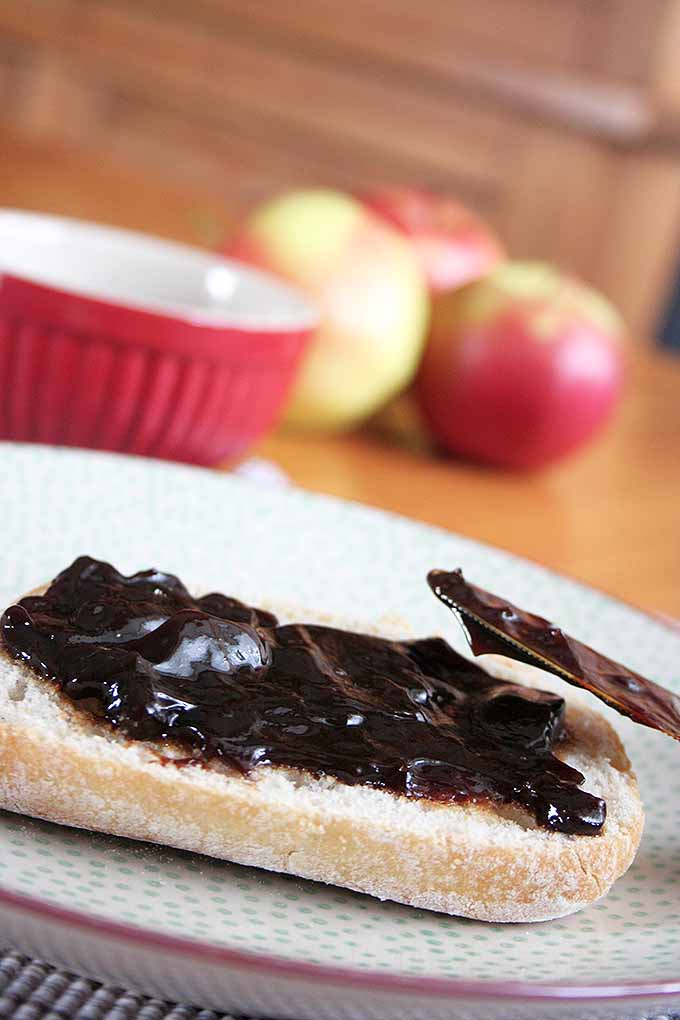
While more people are becoming concerned about local and homegrown foods, slow-cooked apple butter made with fresh apples from local orchards continues to gain popularity, especially among supporters of the slow food movement.
Here in Germany, apple butter – literally called apple kraut – is a very traditional product. The region Rhineland in North Rhine-Westphalia is best known for it.
The term Rheinisches Apfelkraut (Rhenish apple kraut) even has an official protected geographical indication, applying only to original products from this part of Germany that fit the legal product requirements.
The strict rules allow producers to use only apples and a limited amount of pears, sugar, and spices to increase the sweetness and flavor.
Nothing more than boiled juice made of fresh fruits, the finished spread is labeled as a natural product without additives.
Naturally delicious!
Other Popular Spreads
A famous variety that is related to our apple butter is Sirop de Liège from Belgium.
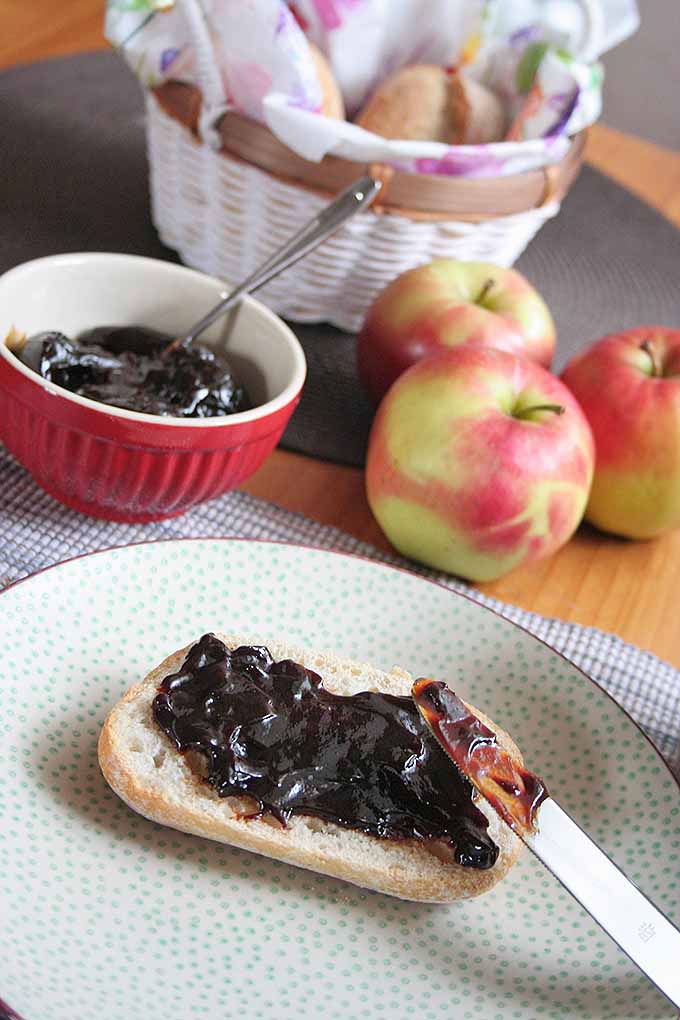
While it has a similar consistency, there are some differences in the ingredients. It not only contains apples, but also pears, dates, and sometimes apricots or plums.
Producers of the spread have other kinds that are enriched with different spices, such as cinnamon or ginger. Assorted berries are occasionally added, as well.
Here on Foodal, we keep it original and go with the pure apple version.
Homemade is the Perfect Way
While you can find it in grocery stores, there is nothing better than trying a homemade version. And it’s as simple as you might guess, because you just need apples – lots of them!
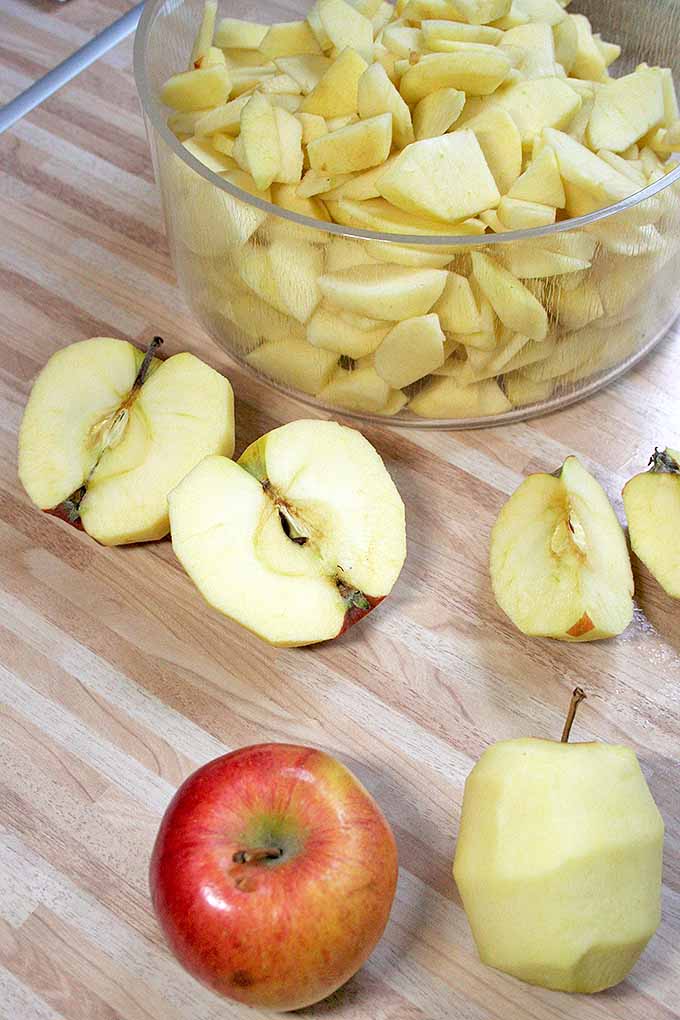
The variety of apples available in Germany is unbelievably huge. And it is typical to use older heritage varieties for this traditional kind of spread.
But don’t worry – the recipe will still work with the varieties sold at any grocery store.
Make sure to choose juicy, ripe, and aromatic apples to get the best results. A mix of sweet and sour works great, as well.
And if you’re wondering how apples can turn into a thick and brown jelly like this without any additional ingredients, there is no magic behind it.
The fruits naturally contain pectin.
This substance is a natural gelling agent that helps to achieve the desired consistency during the cooking and thickening process.
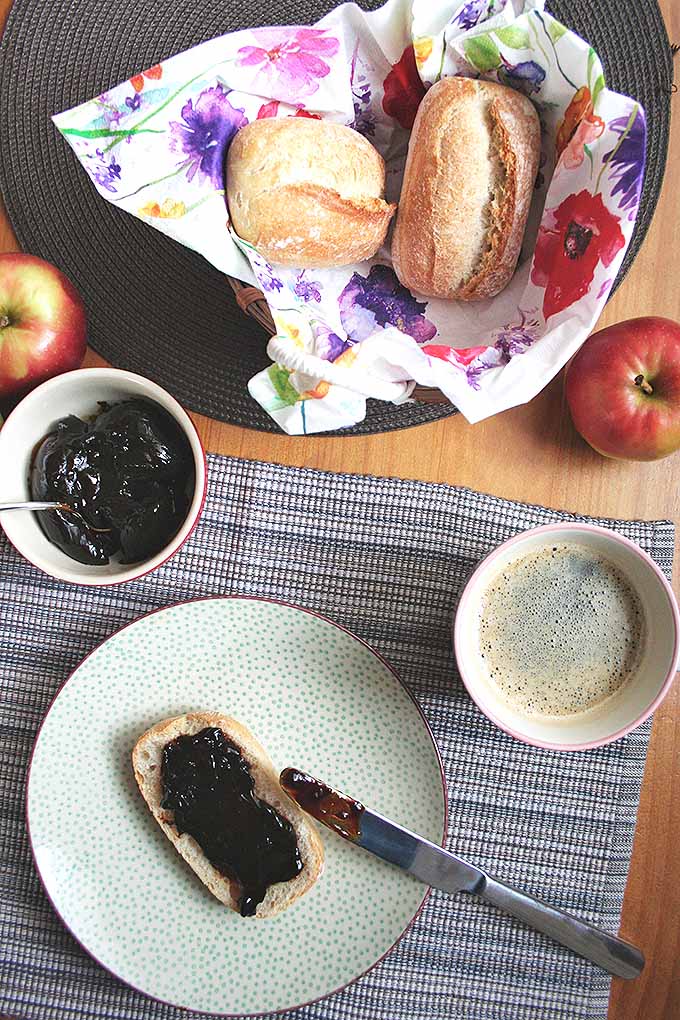
The usages of this product are versatile. Despite its natural sweetness, the tart note also works great with savory dishes like hearty roasts, or fruity sauces or dressings.
As I told you at the beginning, I love it on my weekly pancakes, with a dash of maple syrup on the side. But I can also recommend it on a freshly baked slice of toast or a French croissant.
For sure, you can also add it to various desserts and sweet dishes.
It would be a perfect accompaniment on a cheese plate, a spread to serve alongside homemade ice cream, or a filling in between layers of vanilla cake.
But, first things first – let’s start and make our own jar right now!
The Recipe
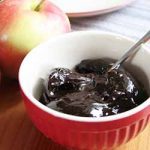
| Servings | Prep Time |
| 15 servings | 30 minutes |
| Cook Time | Passive Time |
| 1 hour | 2 hours |
|
|

|
Get your daily dose of apples with this homemade fruit spread. Enjoy the sweet and sticky treat on pancakes, toast, or by the spoon. Get the recipe now.
|
- 5.5 lbs apples
- 4 cups water (apple juice for a sweeter taste)
- Peel, halve, and quarter the apples. Remove the seeds and cut into chunks.
- In a large pot, bring the apples with 4 cups water to a boil. Leave to cook without a lid for 15 minutes at medium heat until soft.
- Place a colander in a suitable bowl and line with a cloth strainer. Pour the cooked fruit and water into it, and leave to drain for at least 2 hours.
- Twist the cloth and thoroughly press out the remaining juice. Pour the juice into a pot and bring it to a boil. Dispose of the apple chunks.
- Let it cook without a lid at low to medium heat until dark and gooey, about 1 hour. Stir occasionally.
- Transfer to a screw-top jar, seal, and put upside down for 5 minutes.
This recipe yields roughly 14 to 16 ounces of finished apple butter. A 16-ounce glass jar is the best size for storage.
Nutritional Information*
Cooking by the Numbers…
Step 1 – Prepare the Fruit
Peel, halve, and quarter the apples. Remove the seeds and cut into chunks.
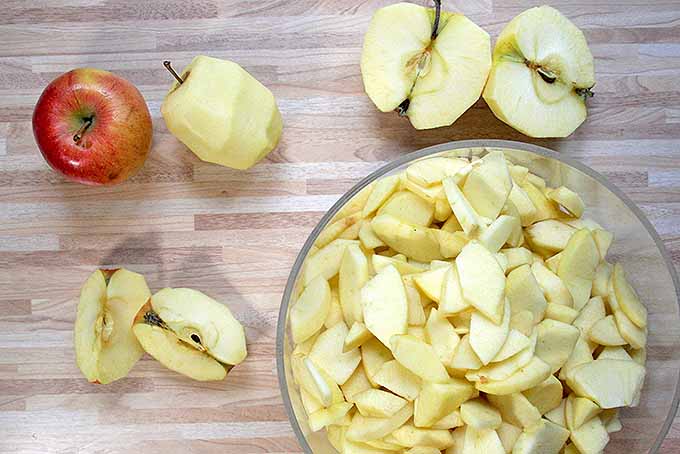
Step 2 – Boil and Soften
Place the apples in a large pot with 4 cups of water. Bring to a boil, and then cook for 15 minutes on medium heat, or until they are soft. You don’t need to cover the pot with a lid.
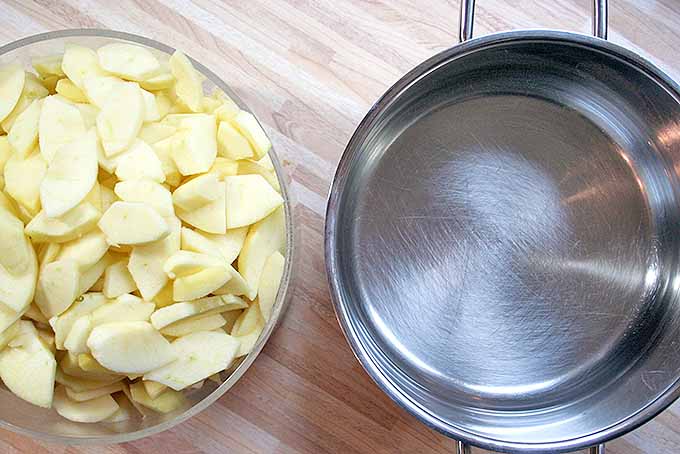
Step 3 – Drain
Grab your favorite colander, and place it in a larger bowl that has enough extra space on the bottom for the juice to drain. Line the colander with a cloth strainer, like a piece of clean cheesecloth. Carefully pour the cooked fruit and water into it, and leave to drain for at least 2 hours.
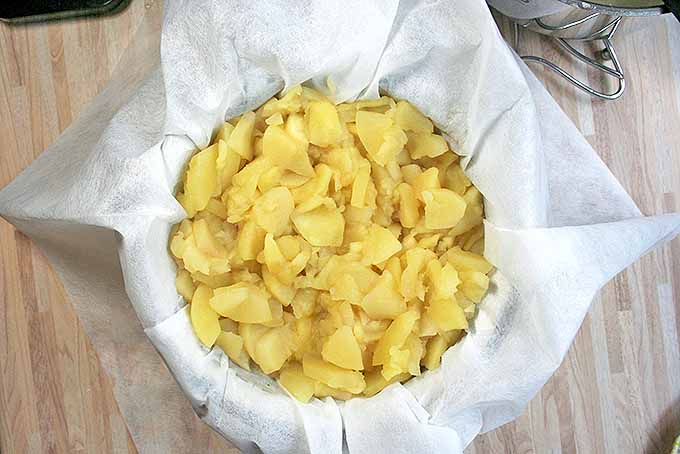
Twist the cloth and thoroughly press the remaining juice out of the apples.
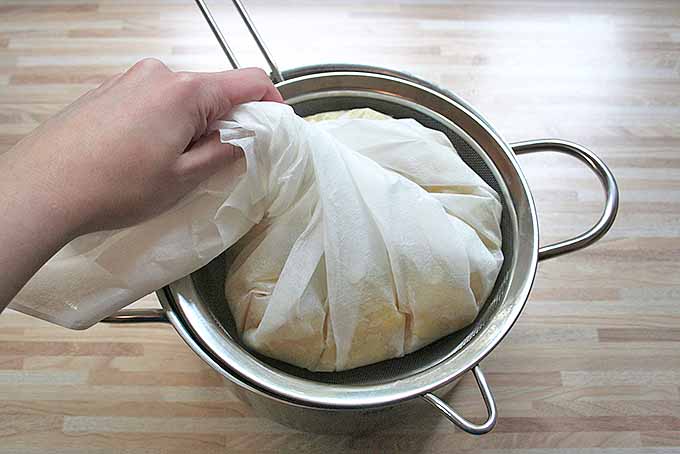
Step 4 – Cook the Juice
Pour the juice in your bowl back into your pot and bring it to a boil. Dispose of the apple chunks.
Let it cook without a lid on medium-low heat until dark and gooey. This will take about an hour.
If you plan to use your apple butter immediately, it can be stored in the refrigerator for up to two weeks.
Larger batches can also be preserved for longer periods. Sterilize your jars, lids, and metal collars as needed, according to safe canning directions. Pour or spoon into each screw-top canning jar to fill (a funnel may help with this), seal, and set aside upside-down for 5 minutes. Store in a cool, dry place.
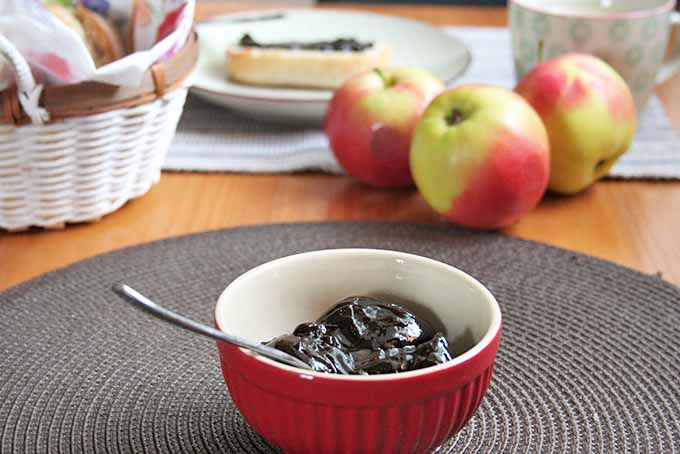
Enjoy a Pure Apple Spread at Home
Apples and patience – these are the only two ingredients you’ll need to make your own fruity and natural apple spread at home. No extra sugar and no preservatives are needed to create a sweet and smooth jam.
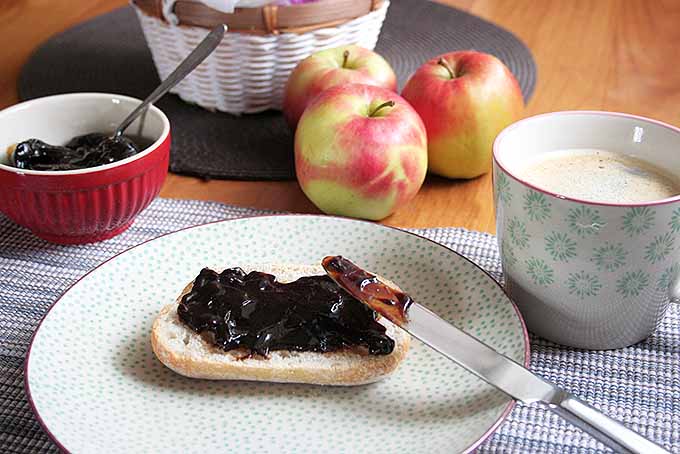
This gooey and thick fruit butter goes fantastically well with a stack of pancakes, a freshly baked roll, or a crispy croissant. And it provides a sweet nuance to add to dressings or sauces, as well.
If you need more help with the jarring process, we have a great canning and jarring tutorial for you to read!
Want more recipes that feature this crisp pomme? Try our recipe for baked apples, stuffed with assorted nuts and dried fruits.
Let us know if you have tried to make a batch of your own. What would your favorite combination be? Share your ideas and thoughts with us below!
Don’t forget to Pin It!
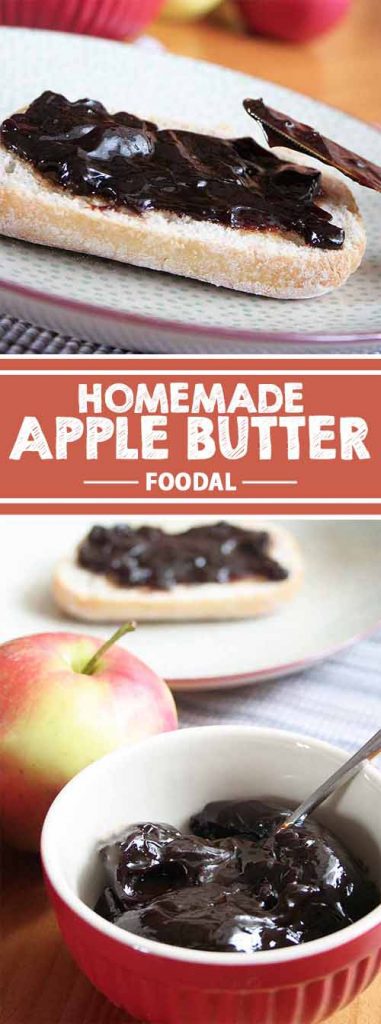
Photos by Nina-Kristin Isensee, © Ask the Experts, LLC. ALL RIGHTS RESERVED. See our TOS for more details. With additional writing and editing by Nikki Cervone.
*Nutritional information derived from a database of known generic and branded foods and ingredients and was not compiled by a registered dietitian or submitted for lab testing. It should be viewed as an approximation.
About Nina-Kristin Isensee
Nina lives in Iserlohn, Germany and holds an MA in Art History (Medieval and Renaissance Studies). She is currently working as a freelance writer in various fields. She enjoys travel, photography, cooking, and baking. Nina tries to cook from scratch every day when she has the time and enjoys trying out new spices and ingredients, as well as surprising her family with new cake creations.

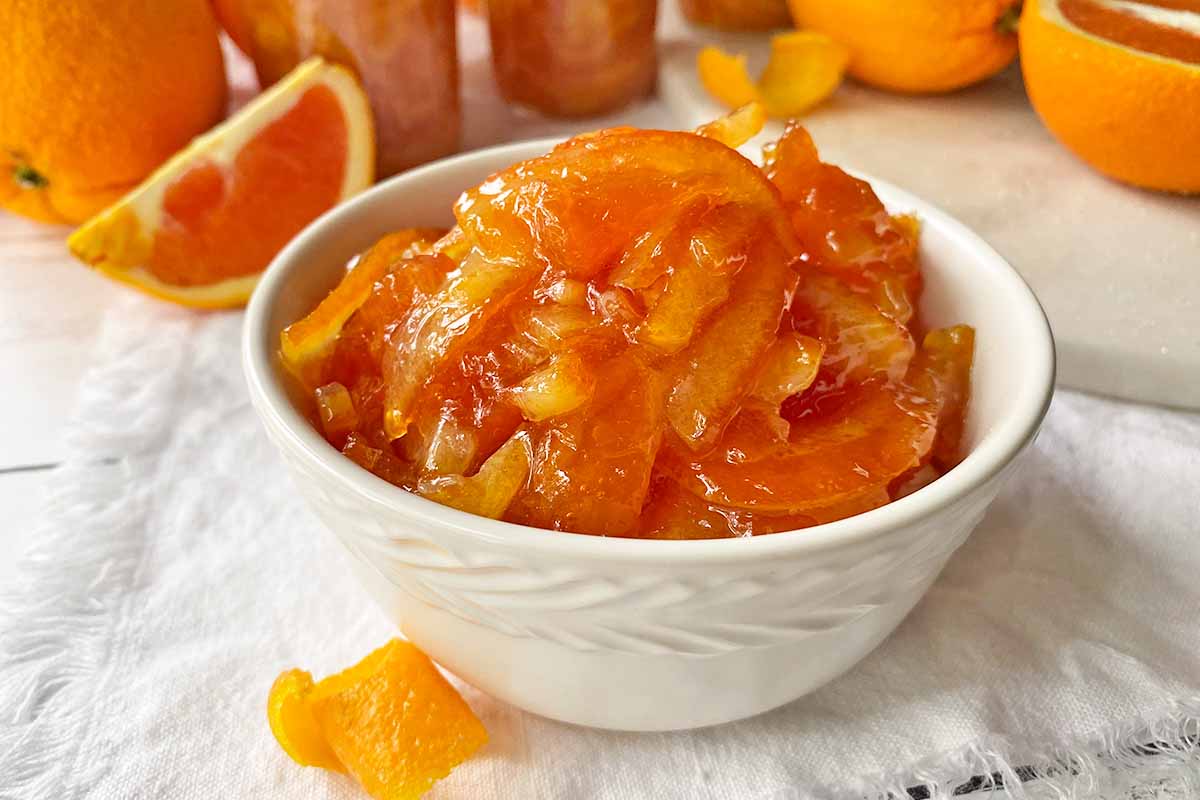
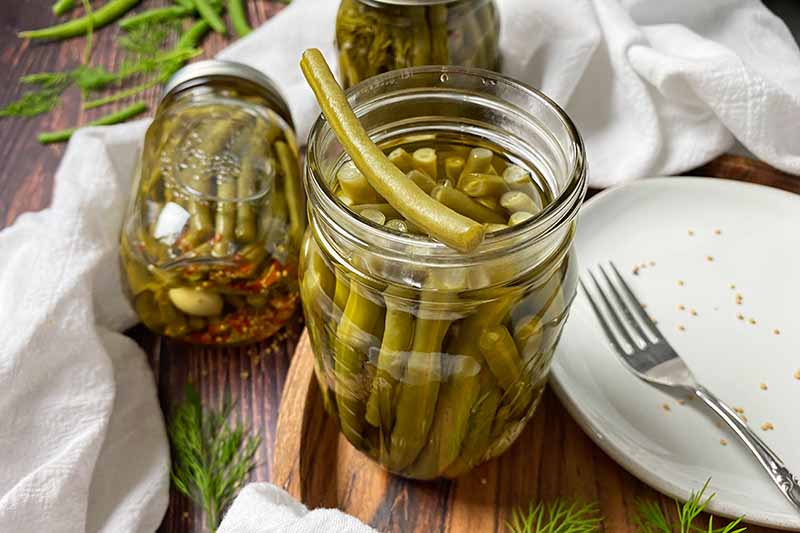
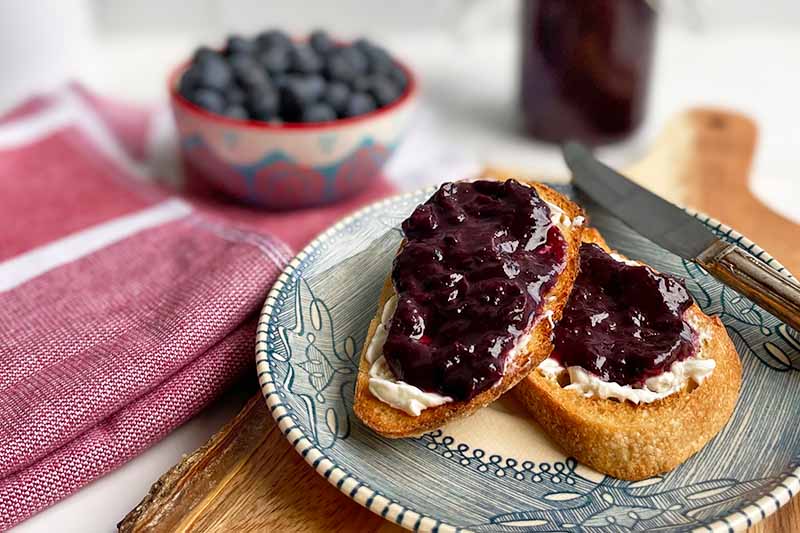
I think this will be the last time I try this recipe. I’ve tried it 4 times and today was the best result, but still nothing like it should be, I follow the recipe exactly. Measuring everything. I finish with 2 small spoons size of jam and it’s still yellow in colour. I don’t understand what’s going wrong. But I’m wasting so many apples and all my time, for nothing!
Hi Sara,
I’m sorry for you troubles. Nina no longer writes for us but I suspect you’re using a variety of apples that’s low in pectin or low acid. Nina stated she normally uses heirloom varieties which likely have lots of pectin.
Pectin (which is what facilitates the gelling) also works better in a higher acid environment, so if you are using a low acid variety like red delicious, this may be the problem. A shot of lemon juice may help fix your issues. Or the addition of off the shelf pectin (available where canning goods are sold). Or the addition of crab apples (naturally very high in pectin).
Hope this helps.
Not to be mean but this is by far the most mind bending recipe for apple butter I have come across. Plus it’s practically black! I have been making butters as well as apple jelly’s, my own apple pectin, for years as I have a tree and need a way to use up apples in a hurry. Now peel, core you apples cook 15 min and strain, really? As the highest amount of pectin is in the skins and core, so it’s quite helpful to cook the whole apple if you are straining it, why peel and core for an hour then throw out the apple? Just cook it all up together save yourself the grief. That aside, traditional butters here are made including the pulp that’s an important part for body and cooked a good long long time to achieve that butteriness, they can be blended to achieve a silky texture, I have cooked mine for day or two before to achieve a darker colour and thicker consistency but I can’t imagine having anything left cooking just the juice down to achieve a black butter.. no wonder the last reviewer was left with only a tablespoon or so!
I did enjoy the story surrounding the apple butter tho! I would like to try their heirloom apples, here in Canada we get always the same 10 or so variety’s it’s like those are the only ones in the world- not so! I bet they would grow well here too.
I agree! Why would you remove almost all of the pectin. Not to mention all of the health benefits that you get from the apple pectin!